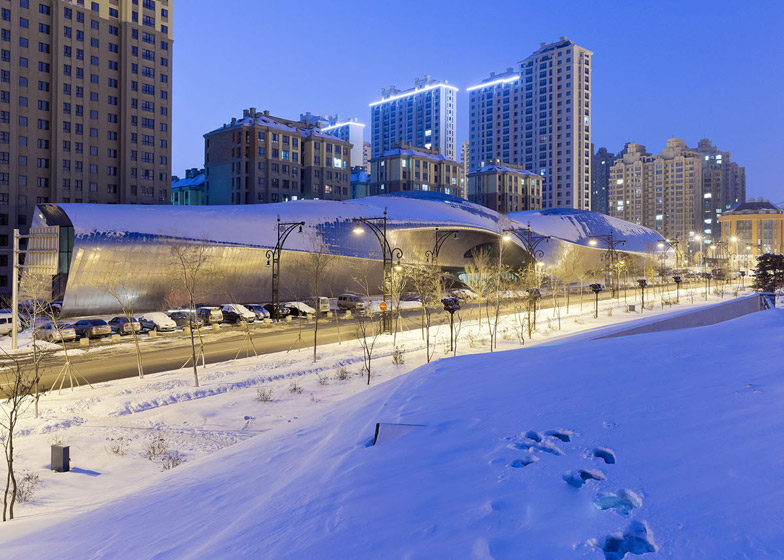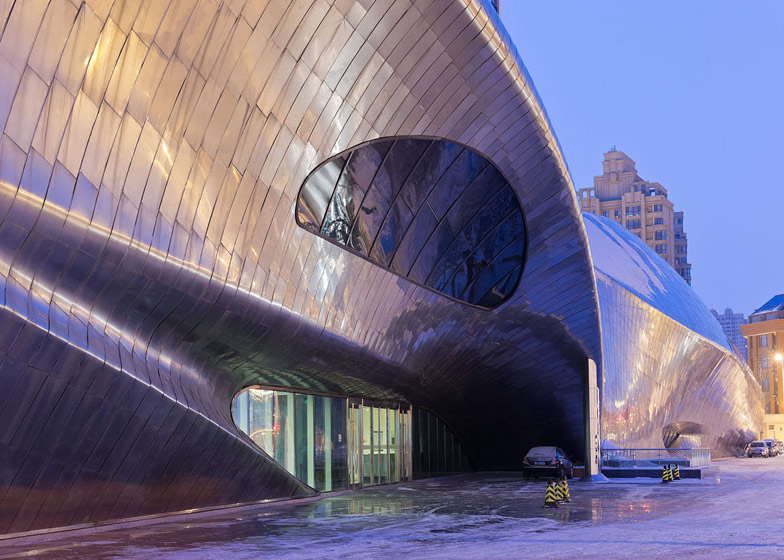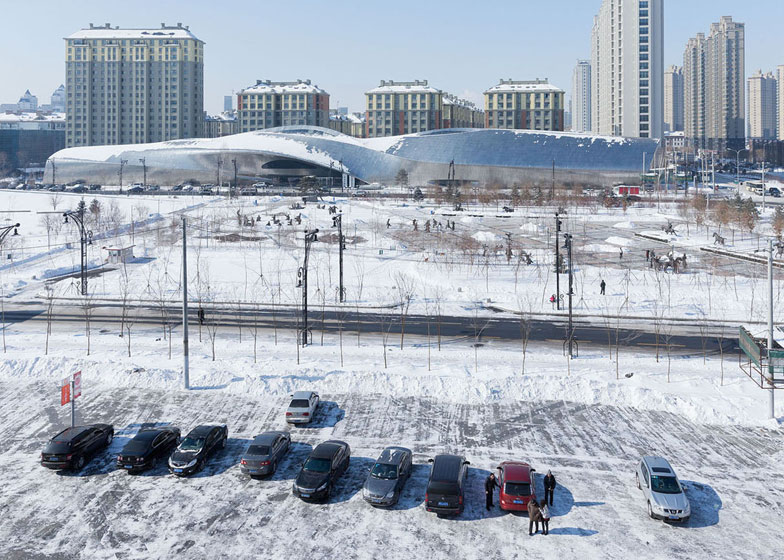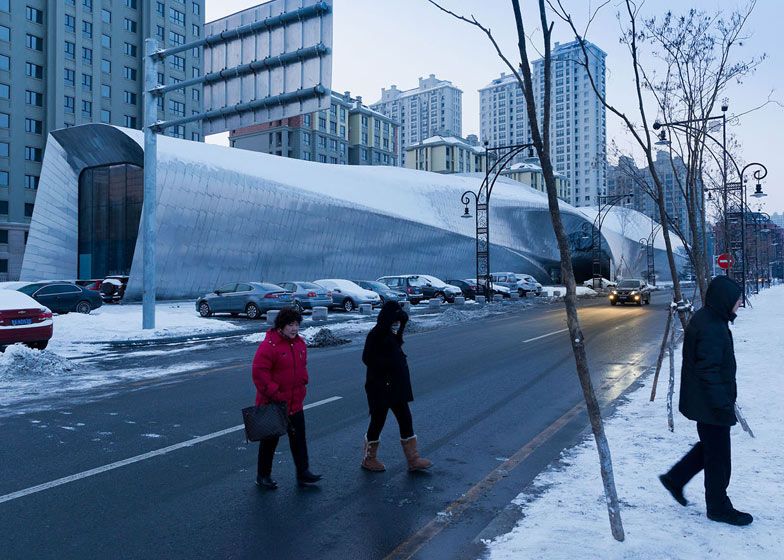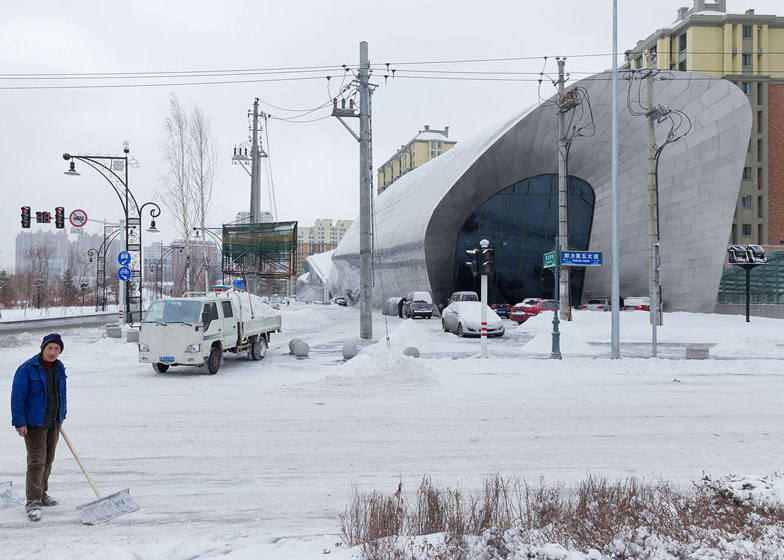Chinese studio MAD has unveiled the first photographs of its icicle-shaped museum for wooden sculptures in Harbin, northeast China (+ slideshow).
Above: photograph by Xia Zhi
Nicknamed the Ice City, Harbin experiences regular snowfall, so MAD designed the China Wood Sculpture Museum with a twisted 200-metre-long body modelled on the shapes made by frozen liquids.
Above: photograph by Xia Zhi
Plates of polished steel clad the exterior of the building and are only interrupted by curving strips of glazing that form windows, skylights and a central entrance.
Above: photograph by Xia Zhi
"The museum embodies some of the foremost conceptual and formal ideals that define the work of MAD, bringing out an expression and abstraction of nature to an otherwise quotidian surrounding," say the architects. "The boundaries between solid and liquid are blurred throughout [the] building, referencing the local natural scenery and landscape."
The museum's three galleries are dedicated to wooden sculptures made by Chinese artists, but will also exhibit paintings depicting the icy landscape of the region.
The China Wood Sculpture Museum is the first completed structure in the Harbin Cultural Island development - a trio of buildings all designed by MAD and including an opera house and cultural centre.
Beijing-based MAD first revealed images of the China Wood Sculpture Museum in 2011, when construction began. Other recent projects by the firm include a pair of curvaceous twisted skyscrapers in Canada and a bulbous museum in Inner Mongolia. See more architecture by MAD.
Photography is by Iwan Baan, apart from where otherwise stated.
Here's a project description from MAD:
MAD China Wood Sculpture Museum Complete
MAD Architects unveiled the completed China Wood Sculpture Museum located in Harbin, China. The 200-metre long building, sheathed in metal, sits nestled in a densely residential area, adding a cultural and surreal essence to the surrounding urban context.
Above: ground floor plan - click for larger image
Appearing so evident amidst a thriving metropolitan district of Harbin, China, spanning 200 metres in length, the China Wood Sculpture Museum sits as a locational anomaly, seemingly out of place, surrounded by a densely populated Chinese-style neighborhood and residential complexes. The museum embodies some of the foremost conceptual and formal ideals that define the work of MAD, bringing out an expression and abstraction of nature to an otherwise quotidian surrounding. The boundaries between solid and liquid are blurred throughout this 13,000 sqm building, referencing the local natural scenery and landscape.
Above: first floor plan - click for larger image
The building's exterior is covered by polished steel plates, mirroring the surroundings and the changing light. The solid walls ensure minimal heat loss while the breaking and twisting motion of the emerging skylights splits the surface and allows in light from the low-hanging sun of northern China; this provides sufficient natural diffused illumination to the three halls on the interior.
Above: second floor plan - click for larger image
The museum mainly houses local wood sculptures as well as paintings depicting the ice and snow of the regional scenery. In the context of the large-scale modern urban setting, the museum itself serves as a new interpretation of nature. The surreal interaction between the museum and the city breaks through the tedium of the urban shell, revitalizing the surroundings with a new cultural feature.
Above: section one
Project: China Wood Sculpture Museum
Year: 2009 - 2013
Above: section two
Location: Harbin, China
Program: Museum
Site Area: 9,788 m2
Building Area: 12,959 m2
Building Length: 196 m
Building Height: 21 m
Above: section three
Associate Engineers: The Architectural Design and Research Institute of Harbin Institute of Technology
Curtain Wall Consultant: Inhabit Group
Panel Optimization: Gehry Technologies
Steel Structure Contractor: Zhejiang Jing Gong Steel Structure Co. Ltd.
Above: exploded 3D diagram
Director in Charge: Ma Yansong, Dang Qun
Design Team: Yu Kui, Daniel Gillen, Bas van Wylick, Diego Perez, Jordan Kanter, Huang Wei, Julian Sattler, Liu Weiwei, Tang Liu, Mao Peihong, Maria Alejandra Obregon, Nickolas Urano, Gus Chan, Shin Park, Alejandro Gonzalez

